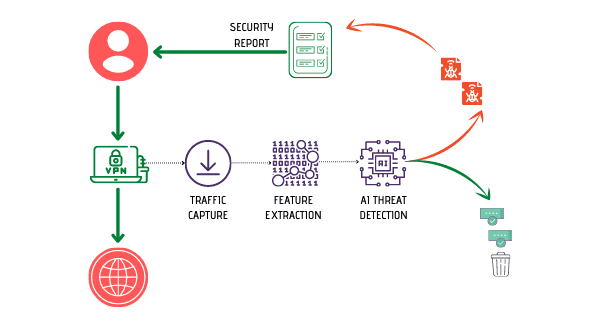AI VPN v0.2 beta releases: provides an security assessment of VPN clients’ network traffic

Civilsphere AI VPN
The goal of this project is to better protect the privacy of civil society by researching and developing a locally and easy-to-implement VPN that checks the traffic of devices with AI-based detection to automatically block threats and stop dangerous privacy leaks. The detection of malicious threats, attacks, infections, and private leaked data is implemented using novel free software AI technology.
The AI VPN is a modular service that automates the generation and revocation of VPN accounts, featuring the automatic capture of network traffic for each account, and the automatic network traffic analysis and reporting of incidents. The AI VPN follows a microservices design and runs using Docker Compose.
The AI VPN is under active development. The functionality of the AI VPN is provided by multiple modules:
| Module | Version | Status | Description |
|---|---|---|---|
| mod_manager | 0.1 | active | Coordinates the operation of the AI VPN |
| mod_redis | 0.1 | active | Data storage and messaging system for modules |
| mod_comm_recv | 0.1 | active | Responsible of receiving new VPN requests |
| mod_comm_send | 0.1 | active | Responsible of sending messages back to users |
| mod_openvpn | 0.1 | active | Provides the VPN service using OpenVPN |
| mod_report | 0.1 | active | Responsible for traffic analysis and reporting |
| mod_slips | 0.1 | planned | Threat detection and blocking |
Motivation
The Civilsphere Project was born in 2018 at the Stratosphere Laboratory of the Czech Technical University in Prague. In Civilsphere we believe that NGOs’ work, as well the work of journalists, activists, and human rights defenders is a critical asset for our society and we need to protect them. It is their critical work that makes them a highly valuable political target for a wide variety of powerful actors. They receive a continuous flow of attacks and technical abuse the jeopardizes liberty and free expression in many countries. At Civilsphere we took a step forward to help them by providing free, advanced digital protection against state actors and others.
The AI VPN was designed to help people at risk obtain a quick and real-time security assessment of their devices’ network traffic to identify if they are compromised or at risk. The integration with the Stratosphere Linux IPS provides state-of-the-art machine learning algorithms to detect malware infections.
This project was created in the Artificial Intelligence Centre of the Czech Technical University in Prague in 2021. This project was initially funded by the NL NET foundation.
Features
The main features of AI VPN are:
- You can install it in your organization and give VPN accounts to your employees
- All the traffic going through the AI VPN is encrypted
- The traffic is automatically analyzed using Slips, a behavioral-based IDS using machine learning and rules
- You can use mails and Telegram channels to request a AI VPN profile. You can configure your own emails and Telegram channels
- A report is automatically created and sent to you using email or Telegram
- The backend VPN can be OpenSSL or Wireguard
- You can use unencrypted VPN in countries where encryption is forbidden, but still provide analysis
- It uses Pi-hole for automatic blocking of DNS requests and protection inside the VPN
Changelog v0.2 beta
- Create CODE_OF_CONDUCT.md by @verovaleros in #19
- Create SECURITY.md by @verovaleros in #20
- Create CONTRIBUTING.md by @verovaleros in #21
- Update issue templates by @verovaleros in #22
- Create pull_request_template.md by @verovaleros in #23
- Create dependabot.yml by @verovaleros in #24
- Enable dependabot alerts by @verovaleros in #25
- Small improvements to Contributing guidelines by @verovaleros in #27
- Bugfix Slips IDS process hangs by @verovaleros in #29
- aivpn.py refactoring by @annabandicoot in #28
- Refactor mod slips by @verovaleros in #30
- Store Zeek logs in the output by @verovaleros in #31
- Refactor mod comm recv by @annabandicoot in #32
- Develop by @verovaleros in #33
Install & Use
© Copyright 2020, Civilsphere Project





